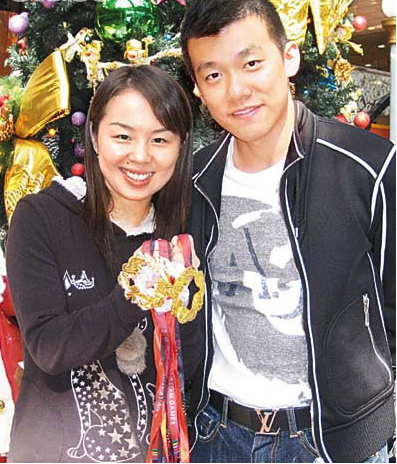(单词翻译:单击)

With the London Olympics fast upon us, WSJ.com introduces the athletes selected to compete at the Summer Games.
在伦敦夏季奥运会开幕前夕,《华尔街日报》网站WSJ.com将介绍一些奥运参赛选手。
Three years ago, Tie Yana was late to her own wedding because she was busy playing a ping-pong match. Fortunately, her fianc谷-and fellow professional ping-pong player-Tang Peng forgave her, they signed the marriage papers, and this month, the duo are headed to London for one of the biggest tests of their careers: the Olympics.
帖雅娜三年前,因为忙于打乒乓球比赛,帖雅娜没能按时参加自己的婚礼。好在她的未婚夫──同为职业乒乓球运动员的唐鹏原谅了她,两人在赛后办理了结婚登记手续。2012年7月,这对乒乓伉俪将奔赴伦敦,迎接他们运动生涯中最重大的考验:奥运会。
Though they're representing Hong Kong, the city where they met and married, both players actually hail from mainland China, where ping pong was early on enshrined as a national obsession by enthusiasts from Mao Zedong to Deng Xiaoping. There, competition to join the country's national team is so fierce that even ambitious top-level talents find it difficult to break through.
虽然帖雅娜和唐鹏将代表香港队参赛(两人在香港相遇并结合),但两位运动员其实都来自中国大陆。在中国,乒乓球很早就成为举国痴迷的体育项目,从毛泽东到邓小平时代都有大批乒乓爱好者。加入国家队要面临极其激烈的竞争,就连雄心勃勃的顶尖健将都很难在众人之中杀出重围。
Both Ms. Tie and Mr. Tang knew their best chance of ever making it to the Olympics meant leaving home. 'There's definitely more opportunities as a player in Hong Kong,' says Ms. Tie, 33, who moved to the city a decade ago after being spotted by a talent scout in Shanghai. 'Ping pong is China's national game, so competition is more fierce.'
帖雅娜和唐鹏都知道,要想获得参加奥运会的机会就意味着要离开故土。33岁的帖雅娜说:“对运动员来说,香港显然有更多机会。乒乓球是中国的国球,因此大陆的竞争更加激烈。”帖雅娜十年前在上海被球探发现,随后移居到香港。
For years, China has allowed plenty of ping-pong players to go abroad, confident that the exodus will scarcely threaten the country's own unparalleled dominance at the sport. 'China's goal is to have us encourage the development of ping pong overseas,' says Mr. Tang, age 31, who came in Hong Kong in 2005 and says that, like Ms. Tie, he gave up his Chinese citizenship for an HKSAR passport. 'So Chinese [ping pong] players go to Africa, to Europe, to Japan-they're everywhere.'
多年来,中国一直允许大批乒乓球运动员移居海外,认为球员的外流几乎不会威胁中国在乒乓球运动中无以伦比的霸主地位。31岁的唐鹏说,“中国的目的是让我们促进海外乒乓球运动的发展,因此中国的(乒乓球)运动员会去非洲、欧洲、日本──世界各地都有他们的身影。”唐鹏于2005年移居香港,和帖雅娜一样也放弃了中国大陆居民身份,持有香港特别行政区护照。
'It's like America's basketball,' says Mr. Tang of China's exports of ping-pong talent. 'There are also Americans who come to China to play basketball, to help the development of the sport in China.'
唐鹏谈到中国向海外输出乒乓人才的现象时说:“这就像美国的篮球运动一样。也有美国人到中国去打篮球,帮助发展中国的篮球运动。”
Though Hong Kong returned to Chinese control in 1997, the former British colony continues to operate with its own independent political and economic system, and also sends its own athletes to compete in the Olympics. The city of 7 million, though, has only ever taken home two medals: a gold one in 1996 for windsurfing, and a silver medal in 2004 for ping pong.
尽管香港在1997年回归中国,但这个曾经的英国殖民地依然保持着独立的政治和经济体制,并派自己的运动员参加奥运会。不过,这个人口700万的城市仅夺得过两块奖牌:一次是1996年帆板项目金牌,另一次是2004年的乒乓球项目银牌。
Like Hong Kong's four other ping-pong Olympic hopefuls (which include two additional talents from mainland China), Ms. Tie and Mr. Tang spend hours per day fiercely volleying ping-pong balls in a cavernous training hall, the floor strewn with white balls like drifts of popcorn. The only sound is the squeaking of sneakers, the echoing tempo of ping-pong balls, and occasional grunts from the players.
和香港其他四名有望在奥运会上拿奖的选手一样(其中有两名也来自中国大陆),帖雅娜和唐鹏每天都会花很长时间在空旷的训练场馆里刻苦练球,地板上满是白色的乒乓球,就像一堆堆爆米花一样。场馆里唯一能听到的声音,就是运动鞋的嘎吱声,乒乓球有节奏的回响声,以及运动员偶尔的嘟囔声。
Though Mr. Tang and Ms. Tie married in 2009, currently the duo live separately in gender-segregated rooms in dormitories along with other athletes who are in training, each with their own roommate.
帖雅娜和唐鹏2009年就结婚了,但目前夫妇俩是分开住的。他们与其他参加训练的运动员一起住在男女宿舍里,每个人都有自己的室友。
'Hong Kong doesn't have much land,' explains Ms. Tie. 'Its resources are restricted. Anyway, the dormitories are a lot nicer than college dormitories.'
帖雅娜解释说,“香港没有多少土地,资源有限;但不管怎么说,运动员宿舍比大学宿舍要好多了。”
When asked whether she has aspirations to win the gold medal this year, Ms. Tie laughs. 'China's team will definitely be really strong,' says Ms. Tie, who has twice competed in the Olympics and is seen as one of mainland China's stronger challengers this year. 'But I'll do the best I can.' She hasn't won any Olympic medals yet, but has defeated players from mainland China in previous competitions, including during the East Asian Games in 2009-just before she married Mr. Tang, as it happens.
在被问到今年是否期望夺金时,帖雅娜笑了。她说:“中国队肯定是非常强的,但我会尽力。” 帖雅娜参加过两次奥运会,被视为今年中国大陆选手的有力挑战者之一。她没有拿过奥运奖牌,但以往曾在一些比赛中击败过中国大陆选手,其中包括2009年的东亚运动会(East Asian Games)──就在她与唐鹏结婚之前。
'That day, everyone was there waiting for me [at the hotel] to finish my competition,' she remembers, including the lawyer that they'd asked to help officiate. 'I was still wearing my sports clothes when I arrived. It was the last game of the day. And I won. It was really such a lucky day.'
她回忆道,“那天所有人都(在酒店)等我打完比赛”,其中包括应邀前来见证婚礼的律师。她说:“我到酒店时还穿着运动服。那是当天的最后一场比赛,我赢了。真是幸运的一天。”
Ms. Tie makes a face and laughs when asked about her husband's chances of bringing home a gold medal, but Mr. Tang-who is competing in the Olympics for the first time-says he's upbeat. 'It's the Olympics,' he says. 'I'm really looking forward to it. Anything can happen.'
被问及唐鹏有多大把握夺金时,帖雅娜做了个鬼脸,笑了起来。唐鹏是第一次参加奥运会,但他说自己比较乐观。“这是奥运会,我真的很期待。什么事情都有可能发生。”
And while he'll be competing against mainland China, Mr. Tang, who was raised in Beijing, says that he doesn't mind having a compatriot for his opponent. 'After all, it's one country,' he says of Hong Kong's relationship with the mainland. 'You can play ping pong with your good friends,' he says. 'You respect your opponent.'
尽管唐鹏将与中国大陆选手角逐,但在北京长大的唐鹏说,他并不介意对手是自己的同胞。他谈到香港与中国大陆的关系时说,“毕竟是同一个国家,你可以跟好朋友同场竞技,你尊重自己的对手。”


